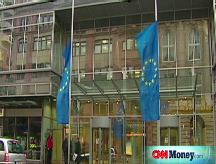Volcker: Financial system needs reform
Coalition of top economic thinkers finds that governments need to revise financial regulatory structures to prevent crises during market turmoil.
NEW YORK (CNNMoney.com) -- A lack of appropriate and necessary banking regulation by governments around the globe led to the current economic crisis, according to a report by a body of leading economists and experts released Monday.
"There is great unanimity in the feeling that regulation and supervision need to be revised," said former Federal Reserve Chairman Paul Volcker, chairman of the board of trustees for the Group of Thirty (G30), at a press conference. "The current situation is an apt illustration of the need for reform."
Volcker presided over the Fed from 1979 to 1987, a period of extreme financial unrest. Volcker is known for raising interest rates to historic highs under the Carter and Reagan administrations in order to combat out-of-control inflation.
The report analyzed financial regulatory structures of 17 governments, including the United States, in an attempt to stabilize markets in the future - and the regulatory system in particular.
"The financial system has raised considerable question about its stability in the future," Volcker added. "It is evident that a number of countries need to revise and reform financial regulatory structures."
G30 found that most governments use one of four approaches to supervision of the financial sector, and all of them need to be revised. The body found some governments determine regulation based on a firm's legal status and others based on the business type. Some countries have one integrated regulator, and others have separate safety and conduct regulators.
"None of these structures by itself has proven to be optimal ... and no one model has appeared unambiguously superior." said Roger Ferguson, vice chairman of G30, former Fed vice chairman and current chief executive of financial services provider TIAA-CREF.
The body said none of these systems work efficiently enough to properly regulate the financial industry, because they are antiquated and do not reflect new business realities. Even the United States, which uses a combination of some of these oversight structures, recognized its own regulatory weakness when the Treasury proposed a new supervision model in March.
Even broken models that can function under "normal" conditions can be exposed as weak during more troubling times such as the current global financial crisis.
"We have seen how regulatory approaches and methodologies that may have worked well under benign financial conditions can break down during a major market disruption," Volcker said. "The financial turmoil that has unfolded over the last year has tested the ability of regulatory authorities to respond effectively to financial crises."
Though G30 did not offer any specific recommendations, the group did offer a few broad ideas about how to reform oversight. They included modernization of regulation to accommodate financial evolution and global integration, promoting an efficient deposit insurance system, flexibility and more effective communication.
"A deposit insurance scheme is a critical element to financial confidence," said Ferguson. "Reforms must also value the necessity of communication and coordination."
The group emphasized the need for global coordination on financial oversight reforms, because today's markets are more integrated than ever before.
"No doubt we are undergoing a fundamental change in the global financial system," said Jacob Frenkel, G30 chairman. "The problem is that things are highly contagious."
Frenkel noted as an example of the "contagions," the quick and widespread effects that the U.S. subprime mortgage crisis had on the global financial markets.
The report mostly consisted of analysis, but the group promised a subsequent report that tackles more specific and in-depth proposals for reforms of regulation.
"This is just a first step," said Volcker. "We will want to say something about the substance of reform in the next few months." ![]()


